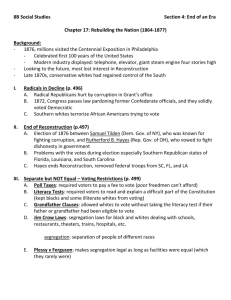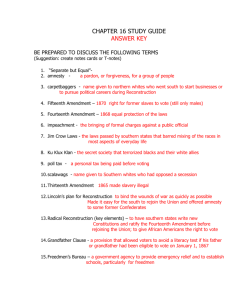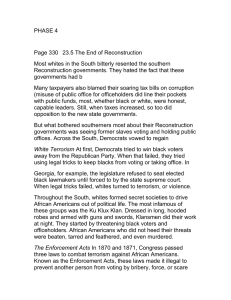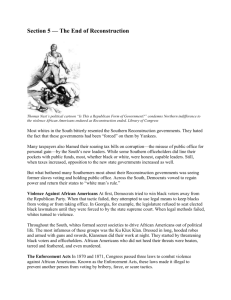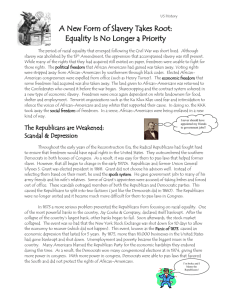The Amnesty Act of 1872 By this time, most Northerners were losing
advertisement
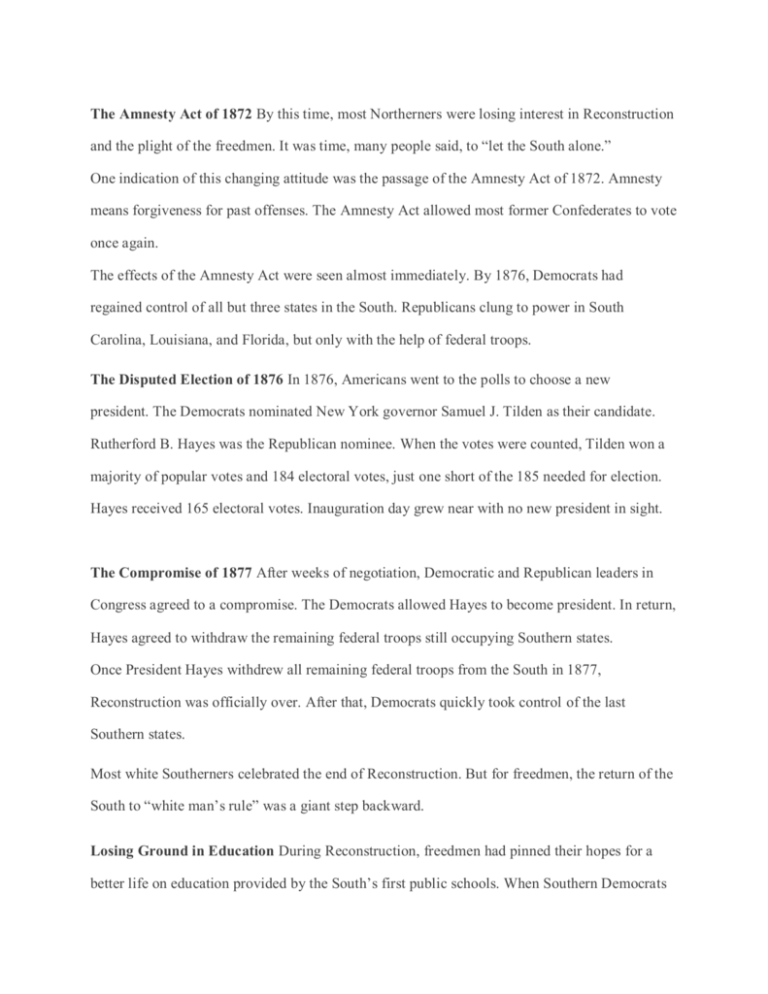
The Amnesty Act of 1872 By this time, most Northerners were losing interest in Reconstruction and the plight of the freedmen. It was time, many people said, to “let the South alone.” One indication of this changing attitude was the passage of the Amnesty Act of 1872. Amnesty means forgiveness for past offenses. The Amnesty Act allowed most former Confederates to vote once again. The effects of the Amnesty Act were seen almost immediately. By 1876, Democrats had regained control of all but three states in the South. Republicans clung to power in South Carolina, Louisiana, and Florida, but only with the help of federal troops. The Disputed Election of 1876 In 1876, Americans went to the polls to choose a new president. The Democrats nominated New York governor Samuel J. Tilden as their candidate. Rutherford B. Hayes was the Republican nominee. When the votes were counted, Tilden won a majority of popular votes and 184 electoral votes, just one short of the 185 needed for election. Hayes received 165 electoral votes. Inauguration day grew near with no new president in sight. The Compromise of 1877 After weeks of negotiation, Democratic and Republican leaders in Congress agreed to a compromise. The Democrats allowed Hayes to become president. In return, Hayes agreed to withdraw the remaining federal troops still occupying Southern states. Once President Hayes withdrew all remaining federal troops from the South in 1877, Reconstruction was officially over. After that, Democrats quickly took control of the last Southern states. Most white Southerners celebrated the end of Reconstruction. But for freedmen, the return of the South to “white man’s rule” was a giant step backward. Losing Ground in Education During Reconstruction, freedmen had pinned their hopes for a better life on education provided by the South’s first public schools. When Southern Democrats regained control of states, however, they cut spending on education. As public funding dried up, many schools closed. Those that stayed open often charged fees. By the 1880s, only about half of all black children in the South were attending school. Losing Voting Rights Southern Democrats also reversed political gains made by freedmen after the war. Many Southern states passed laws requiring citizens who wanted to vote to pay a poll tax. The tax was set high enough that voting, like education, became a luxury that many black Southerners could not afford. Some Southern states also required citizens to pass a literacy test to show they could read before allowing them to vote. These tests were designed so that any African American, regardless of his education, would fail. In theory, these laws applied equally to blacks and whites and, for that reason, did not violate the Fifteenth Amendment. In practice, however, whites were excused from paying poll taxes or taking literacy tests by a so-called “grandfather clause” in the laws. This clause said the taxes and tests did not apply to any man whose father or grandfather could vote on January 1, 1867. Since no blacks could vote on that date, the grandfather clause applied only to whites. African Americans protested that these laws denied them their constitutional right to vote. The Supreme Court, however, found that the new voting laws did not violate the Fifteenth Amendment because they did not deny anyone the right to vote on the basis of race. Drawing a “Color Line” During Reconstruction, most Southern states had outlawed segregation in public places. When Democrats returned to power, they reversed these laws and drew a “color line” between blacks and whites in public life. Whites called the new segregation acts Jim Crow laws.
